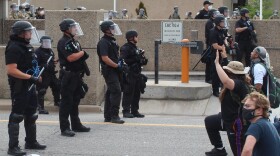For many Black communities, George FloydŌĆÖs death broughtof whole police departments as well as individual officers back to the forefront. Now historic crowds of protesters across the Front Range and the country are continuing to call for massive reform, if not the abolishment or defunding, of police departments.
ŌĆ£As far as a lack of trust,ŌĆØ said Deputy Sheriff Sgt. Tanya Dobbins of the Denver SheriffŌĆÖs Department with a sigh and a long pause. ŌĆ£Unfortunately we earned it. Just like weŌĆÖll have to earn for the community to trust us again.ŌĆØ
Dobbins, who is also president of Black Sheriff's Protective Association, agrees with protesters that there are systemic issues with policing, specifically when it comes to race. But she pushes back against the ideas to defund and abolish that have caught fire in the mainstream and found their way into the city halls of , Denver.
She isnŌĆÖt totally averse to those ideas, though. A super-majority of MinneapolisŌĆÖ city council has pledged to abolish the cityŌĆÖs police department and create a new system of public safety in the city. Dobbins said the proposal is ŌĆ£pretty ambitiousŌĆØ and she ŌĆ£canŌĆÖt wait to see how that works out for them.ŌĆØ But she also thinks a limited or non-existent police force would be a mistake.
ŌĆ£If your suggestion is more right than mine, I hope and pray to have the common sense to say ŌĆśyou know what, letŌĆÖs do it your way,ŌĆÖŌĆØ she said.
There many other parts of the calls for change that Dobbins more closely aligns with. She agrees with efforts to tighten accountability around officers' use of force, better bias training and diverting lower level calls away from police and toward mental health or social work professionals, ŌĆ£as long as theyŌĆÖre not in danger.ŌĆØ
Still, Dobbins believes in her work as an officer and wants to see more Black people join the ranks of law enforcement to help create meaningful change. She wants to be part of the conversation about moving forward and making changes.
Denver Police Sgt. Carla Havard doesnŌĆÖt want her uniform to preclude her from the conversation either.
ŌĆ£WeŌĆÖre not far away from each other with what we think needs to happen,ŌĆØ Havard, the Denver Black Police Officers Association president, told attendees at a virtual roundtable held by the Denver Department of Public Safety last week. ŌĆ£Certainly we may have a different way of going there, but weŌĆÖre not far away.ŌĆØ
She said she became an officer because she understood the impact that police had on Black communities and wanted to make a change from the inside. She says that there has been a ŌĆ£devaluingŌĆØ of Black lives because police departments were not designed with them in mind.
ŌĆ£When I take this (uniform) off, I am Sandra Bland. When I take this off I am Breonna Taylor,ŌĆØ she said, referring to twoŌĆ£I am followed in the stores. I am minimized when I try to get some type of service.ŌĆØ
Police departments have been becoming more diverse over the years,
In 2018, L. Song Richardson and Devon W. Carbado, both legal scholars at the University of California, argued in the Harvard Law Review But they also admit the evidence surrounding the impacts of ŌĆ£black policingŌĆØ can be ŌĆ£contradictory.ŌĆØ
Rob Pride is a sergeant with the Loveland Police Department. He was at the White House in his role as then national trustee for the Colorado Fraternal Order of Police and chairman of trustees for the National Fraternal Order of Police last week for a law enforcement roundtable. He also worked and observed protests in Loveland, Denver and Washington D.C. He said heŌĆÖs conflicted about what the future of policing should look like.
ŌĆ£I do think that there are things that we can do better,ŌĆØ Pride said. ŌĆ£As a Black law enforcement officer, you see some of these things and hear some of these stories and you just have to tell yourself thereŌĆÖs gotta be a way that we as a whole can be better.ŌĆØ
He ŌĆ£truly believesŌĆØ that ŌĆ£99.9%ŌĆØ of police do not bring racism or bias into their work.
ŌĆ£But ours is a profession that we cannot accept or tolerate any of that,ŌĆØ he said. ŌĆ£I think it's easy for us to dismiss that when we have not been a part of bad policing but that doesnŌĆÖt mean it's not happening.ŌĆØ
These protests are important and are going to bring about a change in policing, he said, and that change will make officers better at what they do.
ItŌĆÖs not just these long-time officers who stand by their role. Even as morale drops among existing law enforcement, there are still some newcomers who want to join the force.
ŌĆ£We need more Black people inside our police force,ŌĆØ said Ernest Daniels, a public safety cadet at Denver Department of Public Safety. He said he wants to become a community resource officer specifically to help children in bad situations get the support they need.
He believes that police officers are important to keep the peace, even as protesters push back on that idea. But he said there are a lot of ŌĆ£bad applesŌĆØ and he wants more stringent training and hiring practices to keep them out of police departments.
Sheriff Deputy Sgt. Tanya Dobbins said she has experienced racism as an officer. She has reported it ŌĆö and she wants other officers to do the same ŌĆö even though, she admits, her reports didnŌĆÖt actually stop it.
ŌĆ£If you, me, John, Jim and Jane all report it then it's extinguishing it,ŌĆØ she said. ŌĆ£It has to be done on a mass scale.ŌĆØ
In a recent letter to the Black Sheriff's Protective Association, Dobbins wrote, ŌĆ£I refuse to be silenced or shamed with labels of being a snitch or Inmate Care Officer because I speak against wronging another. Those of us who use those words either have something to hide or lack the understanding of what we do.ŌĆØ
KUNC's Leigh Paterson contributed to this story.






